|
|
|
Sort Order |
|
|
|
Items / Page
|
|
|
|
|
|
|
| Srl | Item |
| 1 |
ID:
163487
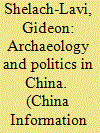

|
|
|
|
|
| Summary/Abstract |
In China, as in many other modern and contemporary states, the past is often used to inform public opinions and legitimate the political regime. This article examines two examples of archaeological exhibitions in China: at the National Museum of China (中国国家博物馆) in Beijing and the Liaoning Provincial Museum (辽宁省博物馆) in Shenyang. It discusses the development and change over time in the content of these archaeological exhibitions, the way they were organized and presented to the public, and the explanations that accompanied the prehistoric artefacts. I argue that the way the past, and in particular the distant, prehistoric and proto-historic past, is presented in Chinese museums reveals a process of entrenchment of the standardized narrative of Chinese history, with a powerful sense of connection and continuity between the past, no matter how distant, and the present. I also argue that although the general outline of the historical trajectory of the ‘Chinese civilization’ is universally accepted, small variations in the way it is presented and the different emphases of the two exhibitions can inform us about various ways of constructing local and national identities in China during the 20th century and up to the current time.
|
|
|
|
|
|
|
|
|
|
|
|
|
|
|
|
| 2 |
ID:
120012
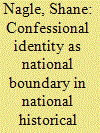

|
|
|
|
|
| Publication |
2013.
|
| Summary/Abstract |
This article explores the question of 'boundary-formation' by examining the significance of historical narratives for defining the nation. Specifically, it compares the historical construction of religious or confessional identity as national boundary in the cases of Ireland and Germany in the nineteenth and early twentieth centuries. The article examines the importance of this historically constructed national identity for rendering continuity to the nation's history and delineating the national 'Other', thereby establishing national particularity. The historical 'joining' of 'Irishness' to Catholic identity and 'Germanness' to Protestant identity, as well as providing cultural 'cement' for the nation, also had exclusionary implications.
|
|
|
|
|
|
|
|
|
|
|
|
|
|
|
|
| 3 |
ID:
169563
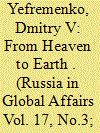

|
|
|
|
|
| Summary/Abstract |
The article explores the role of memory politics in building European identity. Memory politics is considered a functioning system of interactions and communication between different actors with regard to the political uses of the past. Memory politics is one of the key instruments for shaping the macro-political identity of a community. Supranational identity plays only a subsidiary role; at the supranational level, it is impossible to form a stable frame of collective memory. At the same time, European Union institutions are able to act as influential mnemonic actors to develop and implement various strategies of pro-European memory politics. Today, the strategy of recognizing the exceptional role of the Holocaust as a pan-European tragedy is subject to a fundamental revision in the EU.
|
|
|
|
|
|
|
|
|
|
|
|
|
|
|
|
| 4 |
ID:
133303
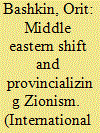

|
|
|
|
|
| Publication |
2014.
|
| Summary/Abstract |
Scholars working on Jewish communities in the Middle East are in the midst of an important historiographical moment, in which the major categories, historical narratives, and key assumptions within the field are undergoing radical changes. A cluster of books and articles written by scholars trained in history, anthropology, and area studies departments, and published in Middle East studies rather than Jewish studies book series and journals, suggests that the study of Middle Eastern Jewish communities in the American academy is undergoing a change which might be termed "the Middle Eastern turn." For such scholars, the history of Jews in Muslim lands, as modern subjects and citizens, is typified by a multiplicity of categories related to their identities-Ottoman, Sephardi, Mizrahi, Arab-Jewish, and local-patriotic-which they explore by looking at the political organizations and social and cultural institutions that enabled the integration of modern Jews into new imperial and national frameworks. This new scholarly wave is transnational, as it illustrates the importance of Jewish networks and Jewish languages in the Middle East, and likewise seeks to draw comparisons between Jews and other transregional and religious minorities, such as Armenians and Greek Orthodox Christians. It is interdisciplinary, as it attempts to incorporate the insights of sociologists, anthropologists, and literary scholars. Finally, it is postcolonial, in its critiques of national elites, national narratives, and nationalist histories. These new accounts uncover how processes which affected the entire Middle East, like Ottoman and Egyptian reform politics and the rise of nation-states, shaped modern Jewish lives.
|
|
|
|
|
|
|
|
|
|
|
|
|
|
|
|
| 5 |
ID:
112397
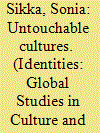

|
|
|
|
|
| Publication |
2012.
|
| Summary/Abstract |
In the context of the philosophical literature on multiculturalism, I argue in this article that models of cultural identity based entirely on the nonvoluntary possession of a set of cultural characteristics are seriously incomplete. In particular, such models cannot address the need, among some groups, to reconstruct, invent and imagine alternative positive identities as a result of historical injustice, and to fill in the content of 'culture' accordingly. As an illustrative case, I survey processes of identity construction among 'Dalits', members of former 'untouchable' and other lower caste communities in India, with a focus on the role of historical consciousness and existing power relations in the imagination of Dalit culture. Dalit strategies of identity negotiation reveal the understandable need, on the part of the members of this community in progress, to produce a cultural identity that makes sense, psychologically and politically, given who they cannot imagine themselves to be, due to the fact of historical oppression. My analysis does not merely target essentialism, nor is it meant to be deconstructive of identity claims. Rather, I highlight select elements within the negotiation of Dalit identity to illustrate (1) the relevance of real historical relations of discrimination and inequality to the construction of culture; (2) the equivocal character of 'choice' within this process; and (3) the emancipatory possibilities provided by imagined narratives of cultural selfhood.
|
|
|
|
|
|
|
|
|
|
|
|
|
|
|
|
|
|
|
|
|